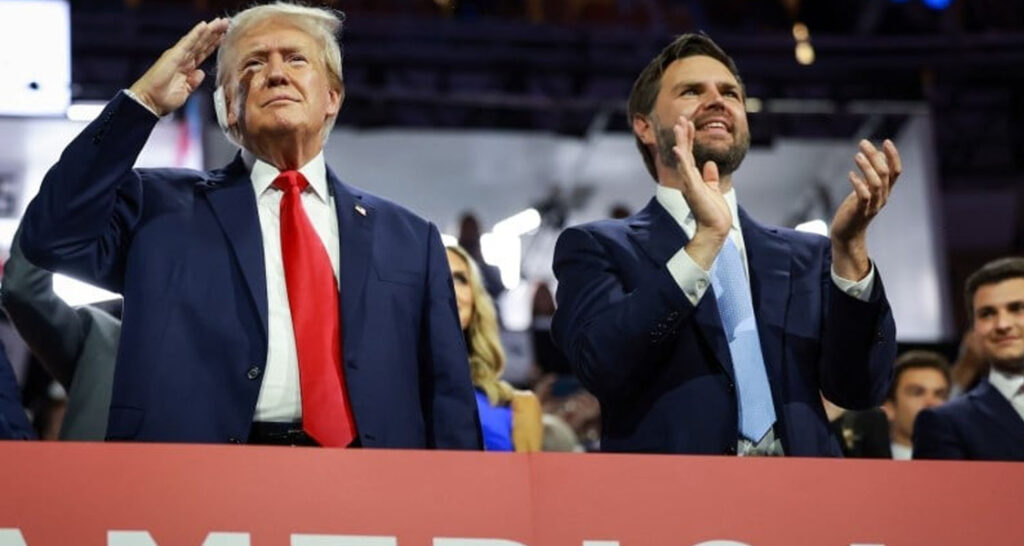The 2024 Republican ticket, featuring Donald Trump and his running mate J.D. Vance, is signaling a significant shift in U.S. foreign policy, emphasizing a pivot from Europe to Asia. This change, analysts suggest, underscores a firm stance against China while adopting a more flexible approach towards Russia.
A Hawkish Stance on China
Throughout the Republican National Convention, Trump and Vance showcased a unified, hardline approach towards China. This stance is consistent with the broader Republican Party’s view of China as a strategic adversary. Vance, in particular, has been vocal about this threat, emphasizing the need for the U.S. to pivot its focus from Europe to Asia. In a recent interview, Vance marked China as the biggest threat to the U.S., reinforcing his commitment to a tougher stance against Beijing.
Trump’s previous administration laid the groundwork for this posture by defining China as a strategic competitor, a view that the current Biden administration has also adopted. Trump’s speeches and the Republican platform both reflect a commitment to strengthening alliances, particularly in Asia, without specifically mentioning Russia or Ukraine.
A Divided Approach to Russia
In contrast to their aggressive stance on China, Trump and Vance exhibit a more nuanced approach towards Russia. Trump has been consistently skeptical about increased aid to Ukraine, a sentiment that aligns with his broader view that European NATO members should bear more responsibility for their defense. This perspective has caused a rift within the Republican Party, as some members continue to advocate for a stronger response to Russia’s aggression in Ukraine.
During his speech at the convention, Trump claimed that the Russian invasion of Ukraine would not have occurred under his leadership. However, his reluctance to fully commit to Ukraine’s defense highlights his preference for a more transactional foreign policy, focusing on direct U.S. interests.
Analysts’ Perspectives
Stephen Wertheim, a senior fellow at the Carnegie Endowment for International Peace, noted that Trump’s selection of Vance represents a significant shift in the Republican Party’s foreign policy. This shift moves away from the neoconservative position that advocates for widespread U.S. military engagement. Instead, it embraces an “America First” and “Asia First” approach, prioritizing the strategic challenge posed by China over the conflict in Europe.
Elbridge Colby, a former deputy assistant secretary of defense, and other “Asia First” proponents within the party are likely to influence Trump’s foreign policy decisions. They advocate for redirecting U.S. military resources from Europe to Asia, a move that aligns with Trump and Vance’s priorities.
Vance’s Influence and Economic Nationalism
Vance’s influence in the potential new administration would likely extend beyond just military strategy. He supports reducing American dependence on Chinese manufacturing, protecting critical supply chains, and taking strong actions against Chinese intellectual property theft and unfair trade practices. His legislative efforts, such as sponsoring a bill to block Chinese access to U.S. capital markets, further underscore his commitment to challenging China’s influence.
Economically, both Trump and Vance advocate for imposing high tariffs on Chinese goods, a continuation of the trade war initiated during Trump’s first term. Vance’s “economically nationalist” stance aligns with Trump’s promises to protect American industries through aggressive trade policies.
Balancing Acts and Future Implications
While Trump and Vance’s policies towards China and Russia differ, they both aim to realign U.S. foreign policy to better serve national interests. This approach might lead to increased tensions with China, while potentially creating room for negotiations with Russia. Analysts suggest that Trump’s transactional nature might lead to temporary tough actions against China, with the ultimate goal of bringing Beijing to the negotiating table.
The upcoming election will be crucial in determining the future of U.S. foreign policy. With Trump and Vance at the helm, America’s stance on global issues, especially concerning China and Russia, is poised for significant changes. As the political landscape evolves, the world will be watching how these shifts impact international relations and global stability.
